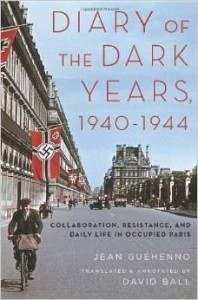Indo-Chinese in Occupied Paris – one small memoir
Posted: June 19th, 2015 | No Comments »This week is the 75th anniversary of the Nazi occupation of Paris in June 1940. When Paris fell and the collaborationist Vichy government, headed by Marshal Petain, took titular control of France there were obviously ramifications for France’s overseas empire. Both Indo-China and the French Concession of Shanghai went overwhelmingly with Petain with Vichy and had only small resistance organisations – the one in Shanghai very small and largely arrested while the resistance in Indo-China was largely British-sponsored. But what of those Indo-Chinese in Paris in Jun 1940? How did they react to the occupation. Probably the best daily record of life during the occupation is that of the teacher and writer Jean Guehenno who interacted with several Indo-Chinese students in Paris at the time and recorded it in his Diary of the Dark Years. Of course the conversations he records do not reflect all opinions at the time and the students he spoke too tended to be privileged, having been sent to France to study at elite ecoles, and were also now seeing the French as defeated rather than conquerors, but still interesting I think….
“January 12, 1941
A visit from N…he is a young Indo-Chinese man, astute, elegant and studious. He wrote French with a kind of love, the same meticulous care he probably exercises when he paints his Chinese characters. Yesterday I could feel he was disturbed and had clearly come for help. He no longer knows where he stands. He told me what France meant for him and his friends in the Saigon lycee four years ago, how they loved her with a romantic love, so strong and at the same time so vague and so endangered. So far away, and what a paradise she was, according to the dreams they had as they read beautiful books and flawless poems together. He talks of this slowly, taking the time to reflect between every sentence. He loves FRance still, he wants to love her. But am I aware of the wretchedness of his fellow countrymen now in France? How they have been abandoned, living only on the aid of the Red Cross and the SAlvation Army? And over there, in Indo-China, am I aware that any willingness to do something is suspect and watched over suspiciously, and how they treat young, cultivated Indo-Chinese, what care they take to maintain them in inferior positions…? And suddenly his face lights up, his eyes shine, his cheeks grow pink, and it is only now that I feel he is abslutely sincere. “You can’t understand what Japan means to us.” That’s what had been so hard for him to tell me: what he had just told me – this new love, no less romantic than his love for France had been. He explains to me that Japan isn’t what it is thought to be in Europe. There is the shining hard Samurai, but there is another Japan, one which has not forgotten the tender, humane lessons of the Buddha…And I listen to N…somewhat embarassed and ashamed. I am obliged to feel that we have not done our whole duty, and that since France had not believed strongly enough in herself – in her essence – she missed her chance for greatness and disappointed, I fear, the love of so many young people whom she could have turned into free men, our equals and our brothers. We’re paying for this lack of faith, we’re expiating this sin. How can we expect these young Indo-Chinese men to defend the empire against Siam and Japan? They would be generous indeed if they didn’t take some pleasure in seeing us humiliated by an occupier as they were by us.”


Leave a Reply